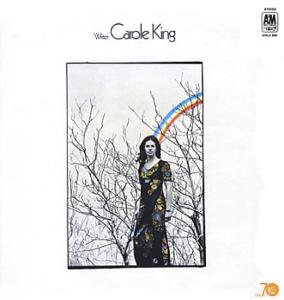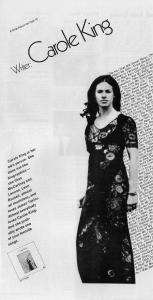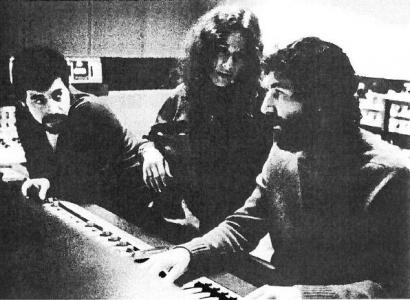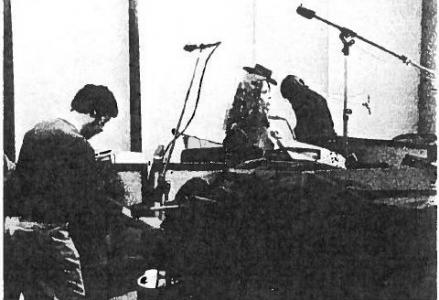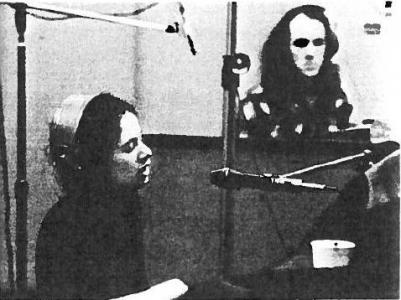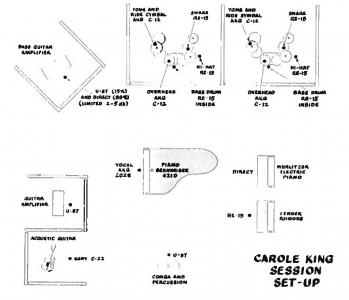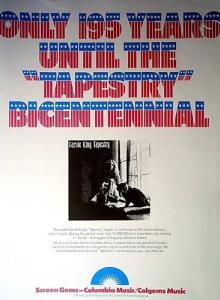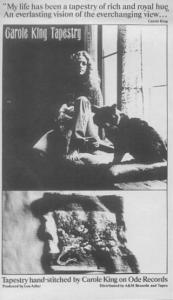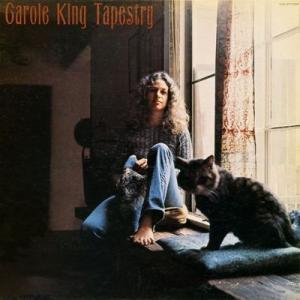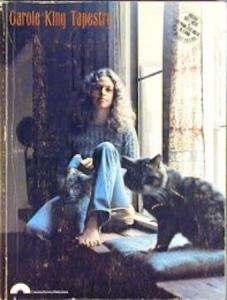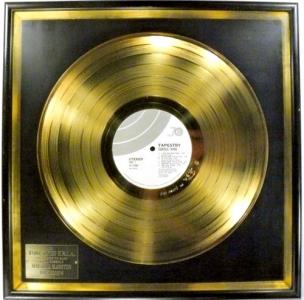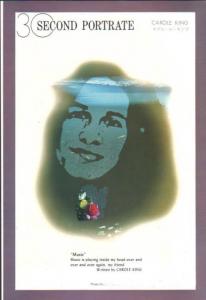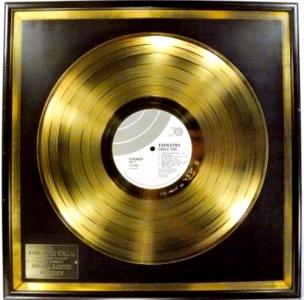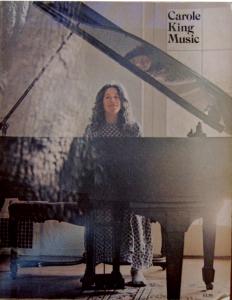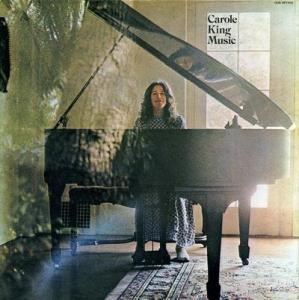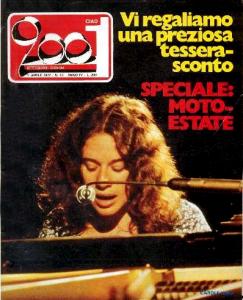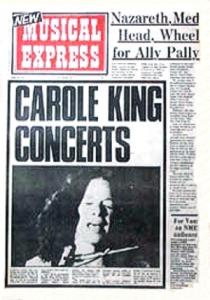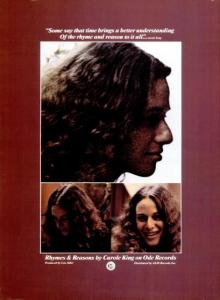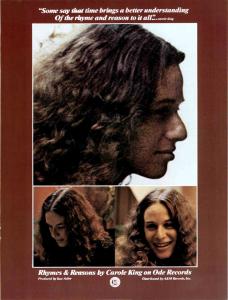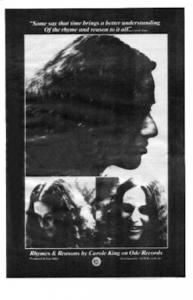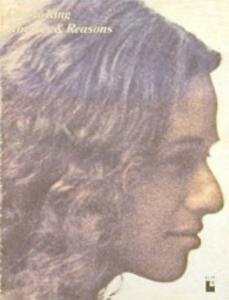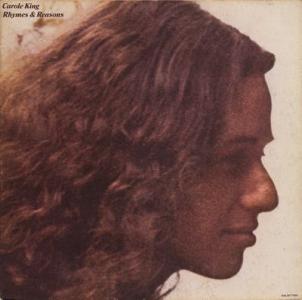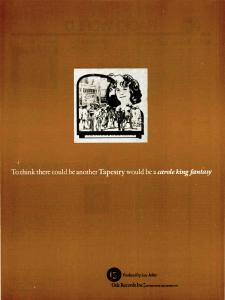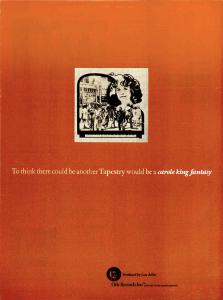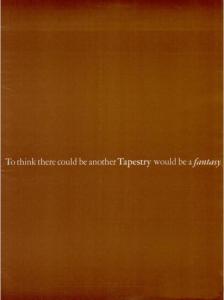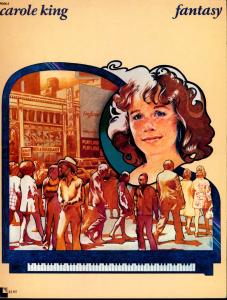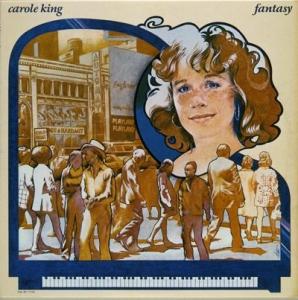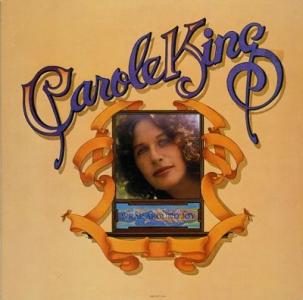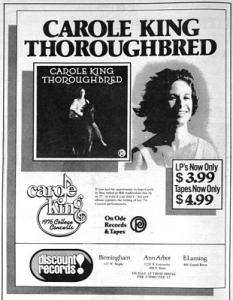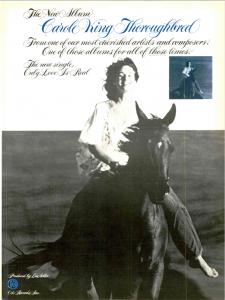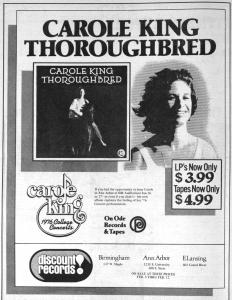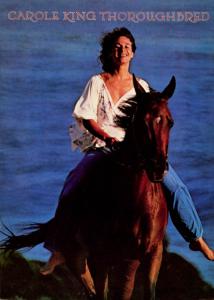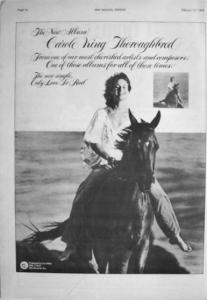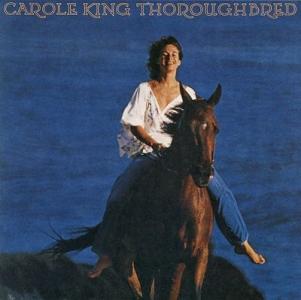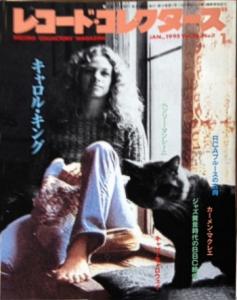
CAROLE KING ON ODE RECORDS
- WRITER
- TAPESTRY
- MUSIC
- RHYMES & REASONS
- FANTASY
- WRAP AROUND JOY
- REALLY ROSIE
- THOROUGHBRED
- RECORDS BY YEAR
CAROLE KING: WRITER
Carole King met Lou Adler when he was the West Coast head of Aldon Music, her first music publishing company. By 1968, Carole's music publisher was Screen Gems. Her agreement as a songwriter for Screen Gems provided that she was to record for a label owned by Columbia Pictures Industries. However, Screen Gems allowed her to work with Lou Adler at Ode Records because King felt more comfortable.
In 1968, Adler created Ode Records. One of Adler's initial signings was a trio called The City. The City was Carole King, Charles Larkey on bass and Danny Kortchmar on guitar and vocals. The group released one album Now That Everything's Been Said.
In 1970, Carole King was considering another album when Adler suggested that it be by Carole King as a solo artist.
In early May 1971 Writer hit the Top LPs on Billboard chart and would peak at #84.
In Japan, Writer peaked at #67.
WRITER'S POPULARITY WITH OTHER ARTISTS
Spaceship Races recorded by one other artist
No Easy Way Down recorded by 15 artists
Child of Mine recorded by 19 artists
Goin' Back recorded by 34 artists
To Love recorded by eight artists
What Have You Got to Lose
Eventually recorded by two artists
Raspberry Jam
Can't You Be Real
I Can't Hear You No More recorded by 11 artists
Sweet Sweetheart recorded by six artists
Up on the Roof recorded by 65 artists.
You can see the artists who recorded each song and the year of release in the C.K. Songs section.
TAPESTRY: Album History

Tapestry was recorded in A&M Studio B during January 1971. The album was released on February 19 1971 and sold four million copies in its first year of release.
It debuted on Billboard on April 10, 1971 and within six weeks was in the top 10. It remained in the top 10 for 46 weeks and Tapestry was #1 on the Billboard Pop Album chart for 15 weeks beginning on June 19. The 15-week mark for a solo woman artist held for 40 years, when Adele's album 21 topped it in 2012. Tapestry remained on the Billboard album chart for more than six years. The album returned to the Billboard Album Chart in 2010 and drifted on and off the chart until 2016.
April 17, 1971, Tapestry debuted on Canada's RPM 100 album chart at #97. On July 3, it reached #1. It held at #1 for five weeks.
May 1, 1971 Billboard reviewed "I Feel the Earth Move/It's Too Late" and wrote, "From her current Top 20 LP, 'Tapestry' come two strong sides and both or either should put her high on the Hot 100. First is a funky beat folk rock ballad, while flip is an equally strong ballad performance."
June 7, 1971 Tapestry certified gold by the Recording Industry Association of America (RIAA)
June 19 Tapestry was the #1 best selling tape cartridge in the U.S. It held in #1 until September 25, 1971.
In July Little LP's Unlimited released the jukebox album of Tapestry. It had "You've Got a Friend," "Smackwater Jack," "Will You Love Me Tomorrow" and "Where You Lead."
TAPESTRY: The Singles in the U.S.
June 26, 1971 "It's Too Late/I Feel the Earth Move" topped the Billboard Hot 100 chart and held the position for 4 weeks. It also topped the Top 40 Easy Listening Chart and held #1 for 4 weeks. It was Carole King's first No. 1 single occurring on June 19, 1970. Tapestry was in its second week at #1 on the Top LP Chart.
June 26 through July 17, 1971, "It's Too Late" was the #1 single on Cash Box
July 3 "It's Too Late" hit #1 on Billboard's Top 40 Easy Listening Chart and held the top spot for three weeks. "It's Too Late/I Feel the Earth Move" peaked at #2 in Canada.
July 21, 1971 "It's Too Late" certified a million selling single (gold) by the RIAA
Carole King went on James Taylor's tour of Britain in July and was scheduled for four concerts at the Greek Theater in Los Angeles in August. Carole's appearance at the Greek was sold out every night.
August 14, 1971 as reported in Billboard, "It's Too Late" debuted on the British charts at #49 and peaked at #6. In Malaysia the single was at #2. It was #5 in Singapore and would peak at #3.
August 21, 1971 "It's Too Late" became a Top 10 song in Mexico where it peaked at #5.
August 21, 1971 "So Far Away/Smackwater Jack" debuted on Billboard's Hot 100.
September 4, 1971 "So Far Away/Smackwater Jack" debuted on Billboard's Top 40 Easy Listening chart at #21. It would peak at #3 on October 2, 1971.
By September 15, 1972, Tapestry sold more than 5.6 million copies. It became the biggest-selling individual record album in U.S. history.
By August 1973 Tapestry had sold nearly 11 million copies and grossed over $50 million. It was the biggest selling album in recording history.
Beginning on May 10, 1975Tapestry moved back up the Billboard Top LP chart. Radio was programming Carole King specials and Carole King days to boost their ratings. Retailers were still using floor displays for it--highly unusual for an album that was nearly four years old. Ode Records opined that people might be replacing worn out copies. Unlike albums where people would play one or two tracks, Tapestry was an album that people played both sides straight through. Tapestry also climbed in the chart with each new album King released because all of the albums rose to the top of the chart.
TAPESTRY: The Album and Singles Around the World
September 4, 1971 "It's Too Late" was #7 in Rio de Janiero and went on to #1 on December 11, 1971.
September 11, 1971 "It's Too Late" was #6 in Australia. Billboard reported the song peaked at #8 in England, #5 in Mexico and #4 in Singapore.
October 2, 1971 "So Far Away" becomes a Top 10 single in Canada at #10.
December 11, 1971 "Smackwater Jack" was #5 in Malaysia.
December 25, 1971 in Rio de Janeiro, Odeon Records had a self-titled Carole King album at #10 on its charts. On the same date in Australia, Tapestry was #3 and #5 in Spain.
In February 1972 both of Israel's radio stations voted Carole King the top female singer of 1971. At the same time Tapestry was #2 on the Galel Zakal chart.
January 4, 1975 Tapestry debuted on Britain's album chart at #49.
In Sweden, Carole's recording of "You've Got a Friend" and Tapestry were Top 10 hits.
TAPESTRY in Music History
Tapestry was the best-selling album in history until 1982 with Michael Jackson's album Thriller.
Tapestry's 46 week run in Billboard Top 10 albums stood until 1986 when Whitney Houston's self-titled debut album tied with it.
By 2013, Tapestry had sold over 25 million copies worldwide.
TAPESTRY: The Awards
October 1971, Carole King received a gold tape for Tapestry.
In Billboard's Talent in Action Awards for 1971, the awards for Tapestry were:
the #3 Top Pop 100 Singles Artist (It's Too Late/I Feel the Earth Move);
the #1 Top Easy Listening Single (It's Too Late);
the #31 Top Easy Listening Single (So Far Away/Smackwater Jack);
the #2 Top Popular Album (Tapestry) .
In Cash Box's Top Awards for 1971
"It's Too Late" was the #2 of the Top 100 Singles;
#2 of the Top 100 Albums (Tapestry)
In Village Voice Jazz & Pop Critics Poll Tapestry was the #10 album of the year
1971 Tapestry was the Best Selling Album National Association of Record Merchandisers
"Go Away Little Girl," "Hi-De-Ho," "It's Too Late" and "You've Got a Friend" were among the 107 Most Performed Songs of 1971 in BMI's repertoire.
Tapestry was a 1971-1972 Edison Award winner in the Netherlands.
Carole King was nominated for all the major Grammy Awards in 1972. On March 14, she became the first woman to win all four major Grammys in one year: Record of the Year, Album of the Year, Song of the Year and Best Female Pop, Rock, & Folk Vocal Performance.
- March 14, 1972 "You've Got a Friend" won the 1971 Song of the Year Grammy
- March 14, 1972 "It's Too Late: won the 1971 Record of the Year Grammy
- March 14, 1972 Tapestry won the 1971 Album of the Year Grammy
Carole's songs were nominated in three other Grammy categories: James Taylor's version of "You've Got a Friend" was nominated for both Record of the Year and the Best Male Pop, Rock & Folk Vocal Performance. Taylor won for Best Pop Vocal Performance Male. Quincy Jones' version of "Smackwater Jack" was nominated for and won the Grammy for Best Pop, Rock & Folk Instrumental Performance, and "You've Got a Friend" by Roberta Flack and Donny Hathaway was up for Best Rhythm & Blues Performance by a Duo or Group, Vocal or Instrumental.
March 1972 NARM named Tapestry its Best Selling LP.
1972, Cash Box ranked Tapestry #1 album of the year.
In March 1972 NARM announced its annual awards based on sales by its members. The Best Selling Album was Tapestry; the Best Selling New Female Artist and Best Selling Female Artist was Carole King.
1988, inducted into the Grammy Hall of Fame.
1993, named the 36th of the 500 Greatest Album of All Time by Rolling Stone and "It's Too Late" was #469 on its list of the 500 Greatest Songs of All Time.
March 1, 1993 Tapestry certified platinum by the RIAA
March 1, 1993 Tapestry certified 2x platinum by the RIAA
July 17, 1995 Tapestry certified 10xplatinum by the RIAA
2000, VH1 selected its 100 Greatest Albums of Rock 'n' Roll. Tapestry was #39 on the list.
2001, James Taylor's recording of "You've Got a Friend" inducted into the Grammy Hall of Fame.
2002, Carole King's recording of "You've Got a Friend" inducted into the Grammy Hall of Fame.
January 24, 2003 NARAS inducted "It's Too Late" into the Grammy Hall of Fame. Singles were chosen for "their enduring artistic quality and for having significantly impacted musical history."
March 19, 2004 The Library of Congress added Tapestry to the National Recording Registry. In only its second year, the Library had selected sound recordings "that are deemed to be culturally, historically, or aesthetically significant."
March 6, 2007, NARM & R&R Hall of Fame rated Tapestry as its #7 album of 2
00 albums every music lover should own.
February 2009, the RIAA and NEA listed their Songs of the Century. "Will You Still Love Me Tomorrow" by the Shirelles was #179. "It's Too Late/I Feel the Earth Move" by Carole King was #213. Little Eva's "Locomotion" was #230.
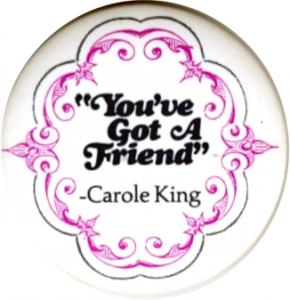
TAPESTRY'S Popularity with Other Artists
I Feel the Earth Move recorded by 56 artists
So Far Away recorded by 49 artists
It's Too Late recorded by 108 artists
Home Again recorded by 20 artists
Beautiful recorded by 18 artists
Way Over Yonder recorded by 13 artists
You've Got a Friend recorded by 350 artists
Where You Lead recorded by 18 artists
Will You Love Me Tomorrow recorded by 231 artists
Smackwater Jack recorded by ten artists
Tapestry recorded by 21 artists
Taken together, the entire Tapestry album has been recorded ten times. "You've Got a Friend" has been covered by other artists more than any other Carole King song.
You can see the artists who recorded each song and the year of release in the Songs Written by Carole King section.
Screen Gems-Columbia Publications released the music book "More Carole King--Composer." It contained 33 songs from the 1960s and 1970s plus career overview and was 96 pages in length. The "Carole King Tapestry" was released earlier.
Review: Carole King Tapestry by Jon Landau in Rolling Stone, April 29, 1971
Winter, spring summer or fall,
All you've got to do is call
And I'll be right there.
Ain't it good to know, you've got a friend.
That thought remains both her outlook and her subject matter: friendship. No one has recently expressed its full range of feelings as well as Carole King and she has done it no where as finely as on Tapestry.
....Tapestry is both a collection of songs and an album. Tapestry is the product of a musician with a specific point of view and the ability to express it through a personal style. It is an album that takes a stand: it doesn't balance one cut against another, one style against another, one feeling against another.
A&M Records' Greatest Hits by Matt Diehl Rolling Stone, September 9, 2012
Jerry Moss: "Tapestry came out on Ode--[Los Angeles music impresario] Lou Adler's label, which we distributed for six years. When it came out, we clearly treated and promoted it as an A&M record. Of course, it did incredibly."
Herb Alpert: "Tapestry was recorded in A&M's studio. Lou had a great concept: he wanted the album to let you hear a great songwriter in an honest way. At that time, a bunch of singer-songwriters were dominating charts--James Taylor, Joni Mitchell, our own Cat Stevens. Those people could write and perform songs on record in a stylish way: laid back and interesting. Tapestry came out of this trend. I remember going to a radio station with the album. The DJ played not one, but three tracks in a row! I saw that and thought, 'This is going to be amazing.' That's how quickly it was accepted."
LOU ADLER ON THE MAKING OF TAPESTRY
"And that was to try to do an album where you could visualize Carole King sitting at a piano, tying the piano to the artist and having Carole do as much of the background vocals as possible and never getting too complicated with the instrumentation. It's a fairly simple recording."
Photos from "Carole King, Lou Adler, and Hank Cicalo in Session at A&M Records"
that appeared in "Recording Engineer and Producer"
MUSIC: the Album History
On December 18, 1971 Music debuted on Billboard's Top Tape Cartridge Chart at #8. It peaked at #3 on December 25, 1971.
Music topped the Billboard Top LPs chart on January 1, 1972 and Tapestry was at #9. Music held the top spot until January 15, 1972. It remained on the chart for 44 weeks.
On January 8, 1972 Music was the top selling tape cartridge in the U.S. and Tapestry was at #8. It held at #1 until January 15, 1972.
Music was the first Ode album to be pressed in quadrophonic format. It used the Sansui matrix QS-1 synthesizer.
Music was the first 4-channel discrete cartridge tape released by A&M Records. The 8-track sold for $7.98 and the cassette for $6.98.
MUSIC: The Singles in the U.S.
The "Pocket Money" single was released in early January 1972.
January 23, 1972 "Sweet Seasons" debuted on the Billboard Hot 100 Chart. It peaked at #9 on March 4, 1972.
February 5, 1972 "Sweet Seasons" debuted on the Billboard Top 40 Easy Listening chart at #25. It peaked at #2 on March 11, 1972.
MUSIC: The Album and Singles Around the World
March 11, 1972 "Sweet Seasons" was #9 in Canada.
April 29, 1972 "Sweet Seasons" was #4 in Malaysia.
May 6, 1972 "Sweet Seasons" was #2 in Hong Kong.
May 27, 1972 Music was the #10 album in Australia.
In Sweden, Music was a Top 10 hit.
Peaked at #8 on Australia's Go Set album chart
MUSIC: The Awards
December 9, 1971 Music was certified gold by the RIAA,
July 17, 1995Music certified platinum by the RIAA.
Cash Box ranked the album #2 on its year end summary.
MUSIC: Popularity with Other Artists
Brother, Brother
It's Going to Take Some Time recorded by 19 artists
Sweet Seasons recorded by nine artists
Some Kind of Wonderful recorded by 21 artists
Surely
Carry Your Load
Music recorded by one artist
Song of Long Ago recorded by two artists
Brighter
Growing Away From Me
Too Much Rain recorded by two artists
Back to California recorded by three artists
You can see the artists who recorded each song and the year of release in the Songs Written by Carole King section.
Review: Carole King Music in Billboard, December 11, 1971
Suggested cuts? After one listen all twelve will be your favorites. A blockbuster!
Review: Music by Tim Crouse in Rolling Stone, January 20, 1972
Anyone who failed to follow up an album that had sold four million copies with a very similar album would have to be either a fool or Bob Dylan. Carole King is neither, and her new album Carole King Music, follows with gingerly tread in the footsteps of Tapestry. The spirit of her music remains warm and strong, her lyrics still carry personal messages of friendship and loyalty, and the same musicians are playing in back of her. Despite the similarity between the two albums, the songs on Carole King Music are not as immediately likable and the new album doesn't have its predecessor's sure, unified sense of style.
Carole King is the most naturally, unaffectedly black of our white pop stars--black in her phrasing, in the feeling of the songs she composes, and in her deep love of rhythm and blues. So it is fitting that she launches the album with "Brother, Brother," a song that appears to be a response to Marvin Gaye's "What's Going On." Carole evokes the musical feeling of Marvin's song with bongos and a beseeching vocal. Marvin had sung "Brother, brother, there's too many of you dying." Now a white sister takes up the same "Brother, brother" refrain and adds her heartfelt assent: "You have always been so good to me/And though you didn't always talk to me/There wasn't much my lovin' eyes could not see/And I don't believe you need all your misery." Whether Carole is speaking to some generalized conception of blacks in America or to one raceless individual, her lyric stands as beautiful.
"Brother, Brother," the best song on the new album, is a perfect example of vintage King. The chord progression--characteristically neat, logical, compelling and unforgettable--marks it as a pop hit. The lyric, as usual, contains an urgent and complex message--a hint of frustration, some warm words of encouragement and a passionate avowal that "you know I love you like no other." In her own songs (as opposed to those with lyrics by Gerry Goffin or Toni Stern), Carole invariably addresses a "you." She is incapable of writing a song that is not to someone; it is because she writes from this personal impulse, not from a pop impulse, that her songs are so moving. This same urgency to reach out and reassure gives her voice its haunting, inimitable tug.
Beyond all this, "Brother, Brother" is unmistakably cast in the black idiom. Three other songs on the album could serve as deadly accurate Motown followups. One has no trouble hearing Smokey Robinson wrapping the raw silk of his voice around the exquisite first two bars of "Surely"--one of the most subtle, serpentine melodic lines Carole has ever written. The wonderful rhetoric of the lyric, inflated with dignity borrowed from Roberts' Rules of Order ("Surely you know how I sta-hand on the issue of my loving you") is worthy of Smokey's "I Second the Emotion." "Brighter" and "Growing Away from Me" could both have come from the Motown songwriting team of Ashford and Simpson and would have made perfect numbers for Marvin Gaye and Tammi Terrell.
All these King cuts have the pop soulfulness and the carefully plotted, almost visible musical structures of Motown hits. What they don't have, unfortunately, is the Motown band handling the arrangements. For Carole's band gives a lukewarm taste of pop and R&B arrangements (e.g. the guitar and celeste figures in the second half of "Growing") without ever defining a meaningful style.
Which brings us to the main problem with the album--the weakness of the backup. Tapestry was adorned with dozens of subtle instrumental touches that emerged with repeated listenings and made the record more durable. (You never really notice the strings on "You've Got a Friend" until you've played the album five times.) But it was Carole's muscular piano-playing, her talent for spreading out chords to achieve the grandest possible effect, and her instinct for syncopating her chord-pounding so that it highlighted her vocal phrasing--it was these things that trademarked Tapestry. Tapestry aimed for a minimal, intimate sound and sacrificed brilliance for a pleasingly consistent simplicity.
On the new album that intimate intent remains but the discipline is gone. Tapestry created the illusion of simplicity whereas much of the backup on Music is merely simple. The band (a group of Carole's friends who toured last year as Jo Mama) always seems to be jamming, making up the arrangements on the spot. Charles Larkey plays interesting, busy bass lines and Joel O'Brien is adequate on drums, but Danny Kootch supplies consistently lame guitar lines. Once again, Carole's songs cry out for the work of a great session guitarist. In fact, the new album has a nice bottom but virtually no middle, since Carole's piano has for some reason been pushed way into the background.
Throughout the album there are half-hearted gestures at orchestration, as if these versions were just sketches for an arranger who is waiting to do the thing up right. If the arrangements for Carole's aforementioned black songs are token Motown, the arrangements for her anglo songs--the ones that sound either like hymns or show tunes--are often downright second-rate. Why dilute the powerful refrain of a lament called "It's Going to Take Some Time" with a Muzak-like celeste, when it cries out for the power of Steinway? Why suddenly doff the hat to Burt Bacharach with some tepid, Bacharach-like horns in the middle of a bouncy road song called "Carry Your Load"? They were so busy putting in the horns that they forgot a drum part, which is what the song really needs.
Of course, there are some fine moments in there too--such as when Curtis Amy peps up a nice little show tune waltz called "Music" with a long and woolly tenor sax solo. But there are also whole songs that are disappointments--throwaways like "Sweet Seasons" and "Back to California." And one of the lowest points on the record is the follow-up to "Will You Still Love Me Tomorrow"--another Goffin-King classic, "Some Kind of Wonderful." Carole gave the Shirelles some real competition in her version of "Will You," but the Drifters' crisp "Some Kind" has it all over Carole's rendition, which is drenched in soupy background vocals.
I find that my second-favorite song on the album, one I listen to again and again, has the simplest arrangement. "Song of Long Ago," in which Carole celebrates the ripening of accidental friendships, features Carole on piano over a spirited bongo and bass bottom, with James Taylor filling in a rich middle on his acoustic guitar. Suddenly Carole has complete control again. The piano punctuates her vocal phrasing, the vocal stands out, and once again we hear what an instinctively brilliant singer she is--a fact disguised by some of the other arrangements. When James weaves his voice with hers, it makes for a meaningful, touching duet, not just background filler.
Like Tapestry this album is rich in both emotion and melody, and in its almost encyclopedic view of friendship it surpasses most popular music. There is no question about the value of the content, only the validity of the style. Carole now has to choose between simplicity and complexity--between piano-cum-combo and a full scale orchestra. The middle ground where she is now standing isn't good enough for her and the sooner she moves on the better. Meanwhile, "Brother, Brother," "Song of Long Ago," and "Surely" provide new evidence that Carole King continues to be one of the major individual talents in pop music today.
November 1, 1972 Rhymes and Reasons certified gold by the RIAA
November 1, 1972 Rhymes & Reasons debuted on the Billboard Top LP chart. It peaked at #2 on the Billboard Top LP Chart.
November 25, 1972 "Been to Canaan" debuted on Billboard's Hot 100 chart. It peaked at #40 on December 9, 1972.
December 9, 1972 "Been to Canaan" debuted on the Billboard Top 40 Easy Listening Chart at #25.
December 30, 1972 Rhymes & Reasons was the #1 album in Canada on the RPM 100 Album Chart.
RHYMES & REASONS
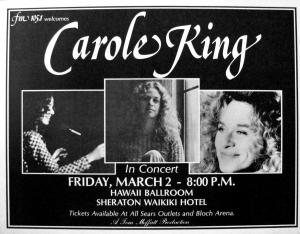
RHYMES & REASONS: Popularity with Other Artists
Come Down Easy
My My She Cries recorded by one artist
Peace in the Valley recorded by one artist
Feeling Sad Tonight recorded by one artist
The First Day in August recorded by two artists
Bitter With the Sweet recorded by three artists
Goodbye Don't Mean I'm Gone
Stand Behind Me recorded by two artists
Gotta Get Through Another Day
I Think I Can Hear You
Ferguson Road recorded by one artist
Been to Canaan recorded by six artists
You can see the artists who recorded each song and the year of release in the Songs Written by Carole King section.
Rhymes & Reasons by Stephen Holden, Rolling Stone, December 21, 1972
Having listened to it many times, I think that Rhymes and Reasons is a major work, a record that you have to live with for awhile, and refer to often, in order to assimilate its full impact. Though I find it musically less exciting than most of Tapestry and some of Writer and Music, I think that structurally it is Carole's most unified, personal album. The theme, implied by the title, is homespun philosophical "Some say that time brings a better understanding/Of the rhyme and reason to it all" and the lyrics are meant to be taken as seriously as the music....For the first time, there are no reprises of her great hits from the 60s. Of the album's 12 songs, all of them new, six are collaborations (four by King-Stern, one by King-Goffin, and one by King-Larkey); the rest are by Carole alone.
The musical virtues of Rhymes and Reasons are subtle. The importance of Carole's longstanding relationship to black music has diminished. There are no tunes with both the tightness and memorability of "You've Got a Friend" and "It's Too Late," not to mention the King-Goffin songs of earlier days. Since the lyric content of Rhymes and Reasons is openly philosophical, the tunes have a roughly equivalent quality they debate more than they proclaim.
...What ultimately makes Rhymes and Reasons so moving is Carole's singing, which grows more assured with each record. The extraordinary warmth of her style, with its total lack of affectation, transforms materials that might otherwise seem banal-commonplace emotional vicissitudes giving them a truth that has the power to heal.
FANTASY
Feb. 12, 1972, Carole King featured on the cover of Time magazine
Lou Adler turned down offers from ABC, NBC and CBS television networks to film Carole King's Central Park concert. Adler recorded the concert himself with the idea to sell it to television. It was supposed to be Carole's first American television appearance.
June 23 Fantasy debuted at #43 on the Billboard Top LP Chart.
"Geraldo Rivera: Good-Night America" featured Carole King and her Central Park concert on July 29. Carole performed "You've Got a Friend," "It's Too Late," "Beautiful," and "Sweet Seasons."
September "Corazon" was released. It debuted on Billboard's Top 50 Easy Listening singles in October and peaked at #5 on December 8, 1973.
October 27 "Corazon" debuted on Billboard's Hot 100 chart on August 31. It peaked at #37 on December 15, 1973.
June 28, 1973 Fantasy certified gold by the RIAA
1973 toured Dallas, Houston, Boston, Washington, D.C., New York, Detroit, St. Louis, Los Angeles and San Francisco
Review: Fantasy by Stephen Holden in Rolling Stone, August 2, 1973
Up through Rhymes And Reasons, Carole King wrote songs that, in their specificity of detail, personal revelation, and narrative force, embodied an extraordinary populist feeling and musical vitality.
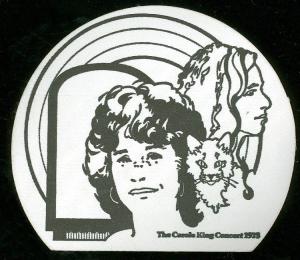
FANTASY: Popularity with Other Artists
Fantasy Beginning
You've Been Around Too Long recorded by two artists
Being At War With Each Other recorded by three artists
Directions
That's How Things Go Down
Weekdays
Haywood
A Quiet Place to Live
Welfare Symphony
You Light Up My Life recorded by three artists
Corazon recorded by 22 artists
Believe in Humanity recorded by six artists
Fantasy End
You can see the artists who recorded each song and the year of release in the C.K. Songs section.
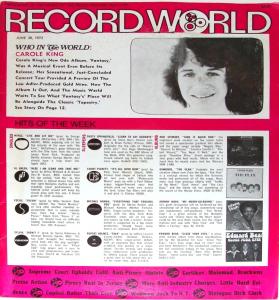
WRAP AROUND JOY
August 1974"Jazzman" was released. It debuted on the Billboard Easy Listening Chart on August 24. It peaked at #4 on November 2, 1974. It also peaked on the Billboard Hot 100 chart at #2 on November 9, 1974.
September Wrap Around Joy was released. It was Carole's last #1 album. It reached #1 on November 4.
October 16, 1974 Wrap Around Joy certified gold by the RIAA
December "Nightingale" was released.
Billboard's annual Talent in Action placed Carole King in these categories:
#13 Top Pop Singles Female Vocalist
#73 Top Pop Album Artist
#10 Top Pop Album Female Artist
#34 Top Easy Listening Singles Artist
January 28, 1975 "Nightingale was Billboard's #36 best selling rock single.
January 11 "Nightingale" debuted on Billboard's Easy Listening Chart at #41. It peaked at #1 on February 22, 1975.
February 19, 1975 the television special Really Rosie debuted. It was Carole's first television project. Carole voiced Rosie in the show as well as singing the songs. Maurice Sendak, whose books were the basis for the television show said, "[Carole's] phrasing is so like the way children act that it makes me wonder if she realizes that she's doing it, whether it's instinct or art." Producer Sheldon Russ added, "When we received her music, it was so outstanding we had to lend even more importance to the music than we had originally planed for the show."
"Jazzman" won the Grammy for Best Pop Female Vocal Performance
Cash Box ranked the album #54 in its year end summary
Sherry and Louise Goffin sang background vocals
WRAP AROUND JOY: Popularity with Other Artists
Nightingale recorded by two artists
Change In Mind, Change of Heart
Jazzman recorded by 14 artists
You Go Your Way, I'll Go Mine
You're Something New
We Are All In This Together recorded by one artist
Wrap Around Joy recorded by one artist
You Gentle Me
My Lovin' Eyes
Sweet Adonis
A Night This Side of Dying
The Best Is Yet to Come
You can see the artists who recorded each song and the year of release in the Songs Written by Carole King section.
Review: Wrap Around Joy by Jon Landau in Rolling Stone, November 21, 1974
....[I]t would be unfair to shortchange the merits of Wrap Around Joy. Although I've fastened onto its missed opportunities, I also find it an engaging work. Although repetitive, the melodies are good; although diffuse, the arrangements have presence; and while David Palmer's lyrics are uninspired, they are consistent with the mood.
Most importantly, Carole King still has the strength to hold so flawed an album together. Although it is far from great, she keeps it entertaining. The woman has soul--she's just been spreading it too thin.
REALLY ROSIE
Television debut on February 19, 1975. The album was expected to be released about two weeks before the television special.
1976 Really Rosie won the Grammy for Best Album for Children
Sherry and Louise Goffin sang background vocals
The album has three songs that did not appear on the television show
Really Rosie
One Was Johnny
Alligators All Around
Pierre
Screaming and Yelling
Ballad of Chicken Soup
Chicken Soup with Rice
Avenue
My Simple Humble Neighborhood
Awful Truth
Such Sufferin'
Really Rosie
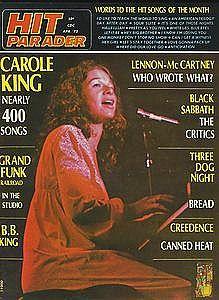
THOROUGHBRED
In mid-December 1975, Carole delivered her last album for Ode Records. Thoroughbred would reach a top position of #3 on the Billboard Top LP chart.
February 4, 1976, Carole played a concert at the Hilton Coliseum in Ames, IA.
Carole King performed a limited tour. On January 23, she was at Illinois State University at Normal; January 26 at the University of Michigan in Ann Arbor, and on February 7 at Vanderbilt University. February 29 at Boston, MA. March 5, 6, and 7 New York, NY. It was her first tour in nearly three years. On tour with her Bobbye Hall, Clarence MacDonald, Russ Kunkel, Leland Sklar, Waddy Wachtel.
March 25, 1976 Thoroughbred certified gold by the RIAA
In Billboard's No. 1 Awards for the Year, Carole or recordings were ranked in these categories:
#8 Albums Female Artist
#85 Album Thoroughbred
#67 Album Artist
#40 Single "Only Love Is Real"
Thoroughbred debuted on the Canadian RPM album chart at #86 on February 21, 1976. It peaked at #29 in Canada April 16, 1976. It stayed on the chart through May 22, 1976.
Thoroughbred peaked #72 in Japan
"Only Love Is Real" debuted on the Canadian RPM Top Pop singles chart on March 6, 1976 at #96. It peaked at #53 on April 10, 1976. It remained on the chart through May 1, 1976.
"Only Love Is Real" debuted on the Canadian RPM Top Pop singles chart on March 6, 1976 at #50. It peaked at #4 in Canada on the AC chart on April 10, 1976
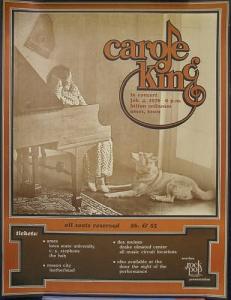
THOROUGHBRED: Popularity with Other Artists
So Many Ways
Daughter of Light
High Out of Time
Only Love Is Real recorded by four artists
There's a Space Between Us
I'd Like to Know You Better
We All Have to Be Alone
Ambrosia recorded by four artists
Still Here Thinking of You
It's Gonna Work Out Fine
You can see the artists who recorded each song and the year of release in the Songs Written by Carole King section.
Review: Thoroughbred by Stephen Holden in Rolling Stone, March 25, 1976
As straightforward a singer as she is a lyricist and composer, Carole King projects one of the most integrated personalities in pop. Her musical and intellectual scope is narrow, but her seven albums...stand as one of the most consistently listenable collections of the rock era. King's melodies are seldom sophisticated but they're almost always catchy, and her lyrics embrace the pop cliche with economy, honesty and good will, turning it into a metaphor for shared experience.
....A triumphant return to the basics makes Thoroughbred King's finest album since Tapestry, and though none of the ten new tunes carry quite the melodic clout of "You've Got a Friend," "Up on the Roof" or "A Natural Woman," taken together they form one of the most emotionally charged pop albums in quite some time. King's new songs are her typical slow-to medium-tempo ballads. They restate the dominant theme of all her work--the relation between romantic love and friendship--though she has never before worked with it so directly.
The joy of rediscovering Carole King is not unlike the joy of first discovering popular music and reveling in its guileless humaneness and democratic power. When Carole King sings, "Only love is real/Everything else illusion" (the most cogent statement of her personal and artistic philosophy), I believe her.
CAROLE KING RECORDINGS BY YEAR
LOU ADLER ON CAROLE KING DEMO RECORDS
"She would play the piano, sing the lead, then sing the backgrounds and put on other piano parts to emulate strings or another instrument. And when I would send these around to the producers and A&R men of the different artists, I could never get them back, they liked them so much. They were, like, within the industry--her demos were famous."
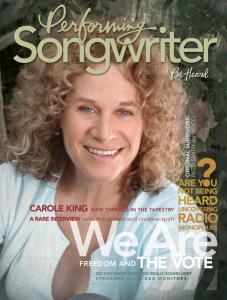
1950's
1958
The Right Girl/Goin' Wild
1959
Oh, Neil/A Very Special Boy
Baby Sittin'/Under the Stars
Short Mort/Queen of the Beach
1960's
1962
It Might As Well Rain Until September/Nobody's Perfect--it started as the demo for Bobby Vee.
School Bells Are Ringing/I Didn't Have Any Summer Romance
1963
He's a Bad Boy/We Grew Up Together
1966
A Road to Nowhere/Some of Your Lovin'
1968
Oct.: Snow Queen/Paradise Alley by The City
That Old Sweet Roll/Why Are You Leaving by The City
1969
First album on Ode Records Now That Everything's Been Said by The City
1970's
1970
First solo album on Ode Records Writer
Up on the Roof/Eventually
1971
Apr. 10 Tapestry
May: I Feel the Earth Move/It's Too Late
July: Jukebox album of Tapestry
August: So Far Away/Smackwater Jack
You've Got a Friend/Beautiful
December: Music
Fit for a King
1972
January: Pocket Money/Sweet Seasons
October: Rhymes & Reasons
November: Been to Canaan/Bitter With the Sweet
1973
June: Fantasy
September: Corazon/That's How Things Go Down
You Light Up My Life/Believe in Humanity
1974
August: Jazzman/You Go Your Way, I'll Go Mine
September: Wrap Around Joy
December: Nightingale/You're Something New
1975
Only Love Is Real/Still Here Thinking of You
Chicken Soup with Rice/Pierre
1976
December: Thoroughbred
High Out of Time/I'd Like to Know You Better
1977
July: Simple Things It peaked at #17 on Billboard's Top 200 Albums chart.
Simple Things/Hold On
Hard Rock Cafe/To Know That I Love You
Two Sides of Carole King, 5 song EP
Labyrinth/Simple Things
1978
May 26: Welcome Home It peaked at #104 on Billboard's Top 200 Albums chart.
Her Greatest Hits Peaked at #47 on Billboard's Top 200 Albums chart.
Main Street Saturday Night/Changes
Disco Tech/Main Street Saturday Night
1979
May 29: Touch the Sky It peaked at #104 on the Billboard Top 200 Album chart.
Move Lightly/Whiskey
Morning Sun/Sunbird
Time Goes By/Dreamlike I Wander
1980's
1980
Jan.: Pearls--Songs of Goffin and King It peaked at #44 on the Billboard Top 200 Album chart.
One Fine Day/Recipients of History
It Might As Well Rain Until September/Nobody's Perfect (reissue)
Oh No Not My Baby/Locomotion
Chains/Hey Girl
Tapestry Half Speed Master
1982
One To One It peaked at #119 on the Billboard Top 200 Album chart.
Read Between the Lines/Golden Man
One To One/Goat Annie
Little Prince/Someone You Never Met Before
1983
Speeding Time
Crying in the Rain/Sacred Heart of Stone
Speeding Time
1986
Mar.: Tapestry original CD
1989
Apr. 4: City Streets It peaked at #111 on the Billboard Top 200 Album chart.
City Streets/I Can't Stop Thinking About You/Time Heals All Wounds 12-inch single
Lovelight CD single
Someone Who Believes in You/Sweet Life
Connoisseur Collection: Goffin & King UK CD
1990's
1991
Feb. 26: Wrap Around Joy (CD)
Feb. 26: Writer (CD)
Feb. 26: Thoroughbred (CD)
Mar. 26: Rhymes and Reasons Japanese CD
1992
Now and Forever
1993
July: Colour of Your Dreams
Lay Down My Life
1994
In Concert It peaked at #160 on the Billboard Top 200 Album chart.
Time Goes By
Natural Woman: the Ode Collection
1995
Tapestry Revisited
Aug. 29: Tapestry Collector's Edition gold CD
1996
Carnegie Hall Concert June 18, 1971
Aug. 18: Pearls Japanese CD
1997
Goin' Back
1998
A Natural Woman The Ode Collection 1968-1976
1999
Her Greatest Hits: Songs of Long Ago
Apr. 14: Honey & Wine Another Goffin & King Song Collection
May 25: Tapestry Original Album Classics series
July 1: Now That Everything's Been Said Japanese CD
Expanded Editions Sampler (Tapestry, Really Rosie, Her Greatest Hits, Now That Everything's Been Said)
2000's
2000
Super Hits
Really Rosie / Her Greatest Hits /Tapestry 3 CD set
Sep. 7 Carole King Brill Building Sessions & More released
2001
Sep. 25: Love Makes the World
Love Makes the World
2002
Mar. 5: Tapestry SACD from Japan released
July: The Early Years British CD
Sep. 2: Her Greatest Hits Songs of Long Ago CD released
Sep. 2: Music/Fantasy double album CD
Oct. 28: Natural Woman the Very Best of Carole King released
The Collection 3 CD set of Really Rosie, Music, Tapestry released
2003
Love for Christmas as an iTunes download.
2004
May 24: Wrap Around Joy Japanese CD
July 6: Really Rosie Japanese CD
Aug. 16: I Feel the Earth Move CD
Sep. 21: Speeding Time CD
Dec. 21: Collections
2005
Mar. 9: The Music of Carole King
July 12: The Living Room Tour
2006
Jan. 30: The Collection
Mar. 13: Crying in the Rain
Mar. 13: The Best Is Yet to Come
2007
May 8: Love Makes the World Deluxe Edition
Sep. 19: The Best of Carole King
Sep. 24: Goffin & King Song Collection 1967-1967
Oct. 23: Welcome to My Living Room
Dec. 15: Brighter
Live at the Troubadour with James Taylor
Discover Carole King
Breaking Up Is Hard to Do
Time Gone By Japanese CD
Welcome Home Japanese CD
Her Greatest Hits Songs of Long Ago Japanese CD
2008
June 16: Original Album Classics
July 29: Carole King Collector's Edition
Jazzman 2 CD set released
Writer Japanese remastered CD
2009:
Apr. 6: Tapestry Legacy Edition
June 19: Collections
Dec. 18: Australian Tour Ticket Buyers Special Edition
2010's
2010
Feb. 23: Writer remastered CD
Apr. 27: The Essential Carole King
An Intimate Performance
2011
Aug. 29: The Essential Carole King
Nov. 8: A Holiday Carole
2012
Jan. 25: Tapestry Japanese CD
Jan. 31: Music (Original Master Recording)
Feb. 28: Welcome Home CD
Apr. 24: The Legendary Demos
Playlist: the Very Best of Carole King
2013
Mar. 4: The Songs of Carole King released
Mar. 6: Tapestry Blu-Spec CD2 released
June: I Believe in Loving You Carole first performed the song at The White House.
July 16: In Intimate Performance

